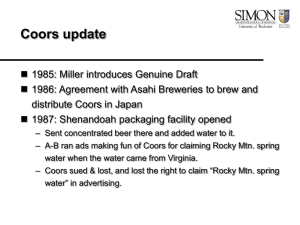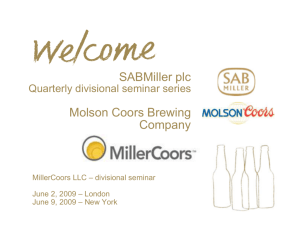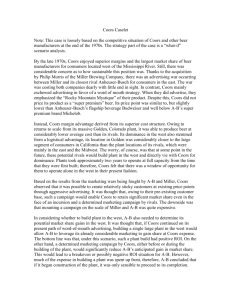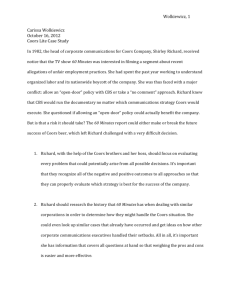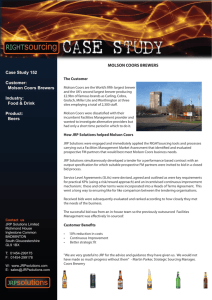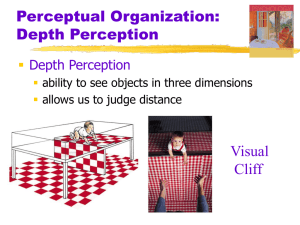MAR_6648_Perceptual_Maps
advertisement
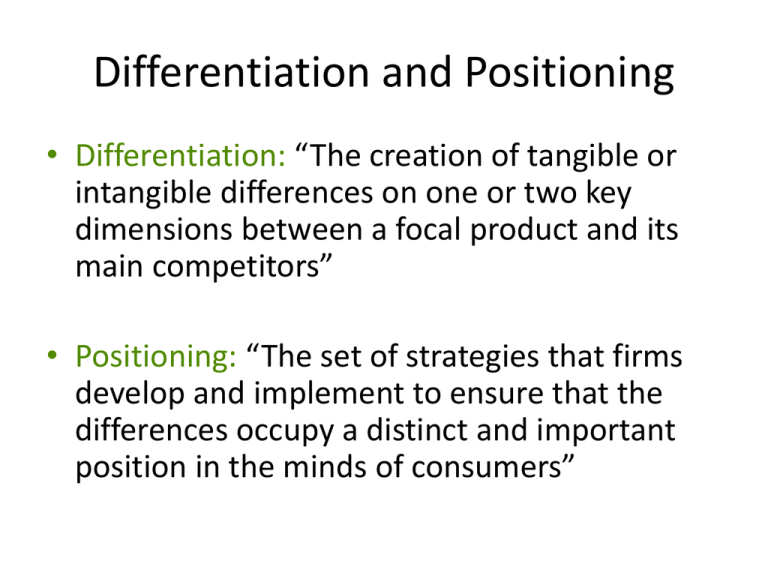
Differentiation and Positioning • Differentiation: “The creation of tangible or intangible differences on one or two key dimensions between a focal product and its main competitors” • Positioning: “The set of strategies that firms develop and implement to ensure that the differences occupy a distinct and important position in the minds of consumers” Perceptual Maps • Key research tool for positioning: Perceptual Map • A perceptual map is a spatial representation in which competing brands are plotted • To create a map we need – Data: Attribute and Preference data – Methodology: Factor Analysis solution Perceptual Map of Automobiles (from WSJ, 1984) Has a Touch of Class A Car to be Proud to Own Distinctive Looking Lincoln Porsche Cadillac Mercedes Chrysler Buick Oldsmobile BMW Pontiac Conservative looking Appeals to Older People Ford Dodge Chevrolet Datsun Toyota Plymouth VW Very Practical Provides Good Gas Mileage Affordable Has Spirited Performance Appeals to Young People Fun to Drive Sporty Looking Many Attributes? Respondent 1 Popular with men Popular with women Good Value Full Bodied Heavy Special Occasion On a Budget Bud 4 6 7 2 2 3 7 Beck’s 7 3 4 3 5 5 3 . . . . . . . . . . . . . . . . . . . . . . . . Stroh’s 3 2 3 6 5 5 2 Use Factor Analysis. Basic idea: Perceptions about several attributes reflect the same underlying perception of a ‘deeper’ characteristic. Input to Factor Analysis Heavy Pop/Men Pop/Women Full Bodied Blue Collar Good Value Spec Occ Beck's Budweiser Coors Ratings of the brands on each attributes averaged across all respondents Coors light Heineken Meister Brau Michelob Miller Miller Lite Stroh's Vectors of attributes can be plotted based on factor loadings. Individual brand’s location on the perceptual map is based on factor scores. Perceptual Map of Beer Market (only Brands) • Old Milwaukee Budweiser • Meister Brau • Miller Beck’s • • Heineken • • • Coors Stroh’s • Michelob • • Old Milwaukee Light Miller Lite • Coors Light Perceptual Map of Beer Market (only attributes) Heavy Heavy Full Bodied Popular with Men Special Occasions Good Value Blue Collar Dining Out Premium Budget Premium Popular with Women Pale Color On a Budget Light Light Less Filling Perceptual Map of Beer Market (both products & attributes) Heavy Heavy • Full Bodied Old Milwaukee Budweiser • Meister Brau • Good Value Popular with Men Miller • Beck’s • Stroh’s Budget • Heineken Special Occasions • Coors Blue Collar • Dining Out Premium Premium • Michelob • On a Budget • Pale Color Old Milwaukee Light Light Coors Light Miller Lite • Light Less Filling Popular with Women Guidelines for Interpreting Perceptual Maps • The arrow indicates the direction in which that attribute is increasing – The attribute is decreasing in the direction opposite to the arrow. – In the map on previous slide, a beer positioned farther and farther in the North East direction are popular with men, whereas a beer positioned in the South West direction is less popular with men. • The length of the line from the origin to the arrow is an indicator of the variance of that attribute explained by the 2D map. – The longer this line, the greater is the importance of that attribute in helping you to interpret the map. – Thus, “Good value” and “Less filling” are relatively more important than “Pale color” and “Blue collar” in explaining how this group of customers discriminates between the different beers. Guidelines for Interpreting Perceptual Maps • Attributes that are both relatively important and close to the horizontal (vertical) axis help you in articulating the meaning of the axis. – Here, the two dimensions along which these customers seem to discriminate between the beers appear to be “Budget-Premium” for the horizontal axis and “Light-Heavy” for the vertical axis. – This interpretation can be based on attributes most correlated with the axes (Premium, Special occasions, Blue collar, Budget, etc. for the horizontal axis, and Heavy, Light, Pale color for the vertical axis). • To position a particular beer on an attribute, draw an imaginary perpendicular line from the location of that beer onto that attribute. – Use both the direction and closeness to the attribute to interpret How to read the perceptual map Heavy Old Milwaukee Budweiser• • Beck’s Heineken • Miller Coors Meister Brau • • • • Michelob • Old Milwaukee Light • • Miller Lite • Coors Light What about demand? • Should we always seek out the “gaps” in the map? • No – we need to think about demand • Two things required to ideal positioning: – No strong competitors in the same location – Demand is sufficiently large • How do we add the demand aspect to the map?

